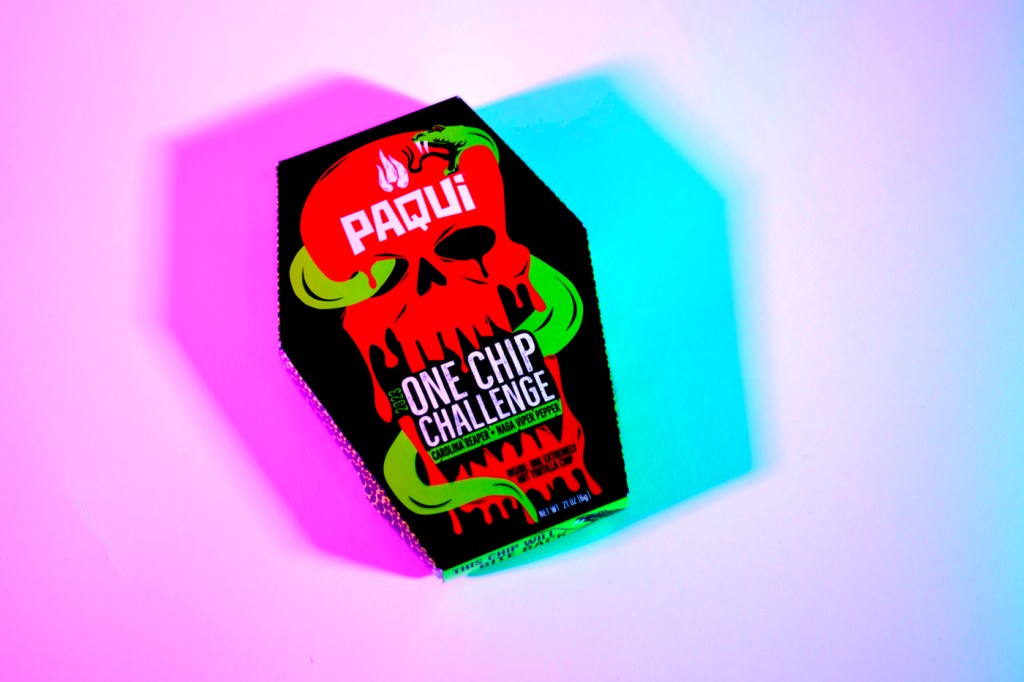Why is the One Chip Challenge dangerous? Northeastern food safety expert explains

Participants in a tortilla chip company’s annual “One Chip Challenge” have peppered social media accounts with reports of nausea, cramps and searing pain in their mouths and throats.
And now a young Worcester teen has died after participating in the One Chip Challenge.
Northeastern professor and food safety policy expert Darin Detwiler says that while the cause of death is yet to be determined, a chemical irritant in the chip’s ingredients is known to cause adverse reactions.
The “One Chip Challenge” is a social media campaign by Paqui Tortilla Chips in which participants are challenged to eat an annual version of a super spicy tortilla chip and hold off for as long as possible on relieving their symptoms with water, milk and food.
Participants are encouraged to post their reactions on social media, which has led to a rash of both adults and teens being filmed bending over in pain after ingesting the chip and either bragging about their feat or warning others against it.
“The ingredient that causes an extreme spicy reaction could be considered a chemical contaminant,” Detwiler says.
The heat comes from the active ingredient in chili peppers, called capsaicin.

While typical adverse reactions to spicy foods include the aggravation of inflammatory bowel disease and gallbladder issues, an overload of capsaicin “could actually put someone in a state similar to a shock, and they can potentially go into cardiac arrest if the stimulus is too severe,” Detwiler says.
This year’s chip comes in a small coffin-shaped box with the image of a red, screaming skull. The ingredients from Carolina Reaper and Naga Viper peppers — some of the hottest peppers in existence — are included, along with blue corn, oil, and salt and pepper.
The rules of the challenge, held annually since 2016, are no longer available on the website.
But the rules posted as of Sept. 5 say, “Eat the entire chip. Wait as long as possible before eating or drinking anything. Post your reaction on social media…”
The website characterized those who last 10 minutes as a “slitherer,” 30 minutes, “venomous,” and one hour, an “apex predator.”
The company announced Thursday, days after the Worcester teen’s death, that it was working with retailers to remove the product from shelves.
Last year, the challenge called those who lasted a full hour without eating or drinking “invincible,” while those who ate or drank a minute after eating the chip were “dismissed as being ‘powerless,'” according to a 2022 Poison Control information sheet.
Top of a heat index
The heat index of chili peppers is judged by something called the Scoville heat unit scale, which gives jalapeno peppers a rating of 2,000 to 8,000 units.
Paqui Tortilla Chips says it doesn’t have a Scoville heat rating for this year’s chip, but the company approximated Caroline Reaper peppers at a whopping 1.7 million Scoville units and Naga Viper pepper at 1.4 million units.
The One Chip Challenge comes with a warning it is for adult consumption only and should be kept out of the hands of children.
It also warns against consumption by people with certain food allergies and sensitivities and advises participants to wash their hands with soap and water and avoid touching their eyes after consuming the chip.
Paqui may warn against consumption by children, but the product is available online — $15.77 on Amazon — as well as through a few convenience store chains.
It’s another example of the challenges posed by direct-to-consumer sales, Detwiler says.
In June 2020, Daily Harvest recalled its direct-to-consumer French Lentil Leek Crumbles due to reports of gastrointestinal illness and potential liver function issues, according to the FDA.
Some customers even needed surgery, Detwiler says.
Teen death in Worcester
The parents of 14-year-old Harris Wolobah of Worcester say he died within hours of taking the One Chip Challenge at school and going to the emergency room, according to media reports.
Detwiler says he wouldn’t be surprised if states and school districts tried to put the brakes on this type of food dare.
“I would imagine that we might see new legislation proposed in Massachusetts regarding the banning of such challenges and dangerous foods in the schools,” Detwiler says.
He says a school district in Colorado has banned the One Chip Challenge and schools in Texas and California sent home warnings after participating students were hospitalized. The Wellesley, Massachusetts, school district last year asked parents to discuss the challenge with their children.
It may take weeks for the Massachusetts medical examiner’s office to determine a cause of death, but in the meantime Lois and Amos Wolobah, Harris’ parents, are warning other families about what they consider the deadly risk of consuming the spicy chip.
Even if the Worcester teen’s cause of death does turn out to be related to the One Chip Challenge, Detwiler says he doesn’t know if the school where it was consumed could be held liable.
The family of the child who brought the chip to school could face potential liability, he says.
“The student who offered the chip must have known that a potential threat existed,” Detwiler says. “This could be viewed somewhat similarly to bringing peanuts to school and giving them to someone you knew had an allergy to them.”
Cynthia McCormick Hibbert is a Northeastern Global News reporter. Email her at c.hibbert@northeastern.edu or contact her on Twitter @HibbertCynthia.






